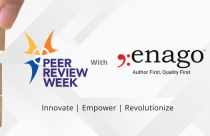5 Great Tips on How to Deal With Peer Review Problems

As a researcher, you may have submitted your original research article to a journal for publication. By doing so, you are disclosing your confidential research work to that journal. If your article gets rejected, you might be left with the fear of peer review ethics being breached. What if your findings get published by whoever reviewed your article? At times, the journals do raise many peer review problems. As your work is confidential and not published, how could you guarantee that if your article is rejected, it won’t be leaked by the journal in any form?
One of the main factors that eradicates the fear of article misuse is ethical peer reviewing. Undoubtedly, peer review problems stand as a cornerstone of STEM publishing.
What are the Fundamentals of Peer Review Ethics?
One can’t define the superiority of any peer review model over another. The benefits and feasibility of different peer review models vary among disciplines. Additionally, journal editors should choose a peer review model that best suits their journal’s discipline and readership.
In order to ensure ethical practices in STEM publishing, peer reviewers must be aware of the fundamentals of the process. Following are the basic guidelines to deal with peer review problems:
- Maintaining the confidentiality of peer review.
- Do not discuss the manuscript or contact the authors directly.
- Declare conflicts of interest, if any.
- Provide constructive criticism.
- The origin or authorship of the manuscript must not influence the decision on the manuscript.
- Avoid reproduction of information or any part of the manuscript under review.
- Reviewing manuscripts within peer reviewer’s expertise.
- Review manuscript by adhering to deadlines.
Models of Peer Review
| TIMING | Pre-prints | Pre-publication | Post-publication |
| IDENTIFICATION | Double-blind | Single-blind | Open |
| MEDIATION | Editors act as mediators for all interactions between reviewers and authors | Reviewers interact with one another openly | Reviewers and authors all interact with one another openly |
| PUBLICATION | Peer reviews are unpublished | The peer reviews are published but not signed | Peer reviews are published and signed |
| FACILITATION | Journal facilitates the review | Third-party facilitates the review | Authors facilitate the review |
| OWNERSHIP | Journal or third party owns the review | The authors own the review | Shared or mixed ownership of reviews |
Committee on Publication Ethics (COPE) Guidelines for Peer Review
Founded in 1977, COPE address breaches of research and publication ethics. Ideally, this voluntary body provides a discussion forum and advice for scientific editors. Furthermore, it aims to find practical ways of dealing with these issues and to develop good practice.
Peer review ethics plays a vital role in maintaining the integrity of scholarly publishing. The core values of peer review are fairness, confidentiality, impartiality, expert assessment, efficiency, security, and transparency.
The process of peer review expects everyone involved to behave responsibly and ethically throughout and abide by the values. Despite the recurrent establishment of the importance of the peer review process, it is often found to be taken up without any guidance and unawareness of ethical obligations.
Since its inception, COPE has produced guidelines with basic principles and standards to which all peer reviewers should adhere during the peer review process. Nonetheless, these guidelines are generically formulated for application across disciplines.
Peer reviewers must abide by standard guidelines mentioned below to deal with peer review problems:
- Complete peer review process must be transparently described and well managed.
- In addition, peer reviewers have an obligation to conduct reviews in an ethical and accountable manner.
- Furthermore, lucid communication between the journal and the peer reviewers is required to ensure consistent, fair, and timely reviews.
- Above all, peer reviewers must strictly adhere to the journal’s publishing policy with respect to adoption of appropriate peer review model, stating conflicts of interest, or peer review problems.
How the Preach Commits Breach!
Peer review ethics is at the heart of STEM publishing. Moreover, researchers lay their blind trust on the peer review system of their target journal. When something is peer reviewed, it is an untold fact that it holds credibility. But, what if the peer reviewers do not live up to the expectations of their responsibility that comes with this task? Here are a few instances to help you understand how peer review problems can be breached by the reviewers, knowingly or unknowingly!
-
Fairness
If the peer reviewer does not assess the manuscript diligently and does not state conflict of interest, appeals, or disputes before reviewing.
-
Confidentiality
If the peer reviewer mistakenly or purposely shares the review report or crucial findings from the assessment of a manuscript to someone other than the editor who would then relay it to the author/s.
-
Impartiality
If the origin or authorship of the manuscript influences the peer reviewer.
-
Expert Assessment
If the reviewer has no expertise in the research domain or allied fields.
-
Efficiency
If the peer reviewer does not provide constructive suggestions for improvement of the manuscript and not adhering to submitting the review report by the promised deadline.
-
Security
Using the manuscript data and publishing it as your own findings after rejecting the manuscript or disclosing the findings of the manuscript to other peers.
-
Transparency
Not following a transparent protocol stated by the journal and not conveying direct final decisions regarding the acceptance or rejection of the manuscript.
Dealing with Peer Review Breach
As an author, it is disheartening to see your efforts put into drafting your research paper go in vain. Here are some quick tips to help you deal with peer review problems breach with confidence:
- In this case, remain neutral and treat all potential unethical cases confidentially.
- Additionally, maintain records of written communication including the allegation and the evidence of the complainant.
- Furthermore, raise the issue with the accused (the peer reviewer) in a timely manner.
- Eventually, assess the facts of the peer review process.
- In addition to this, write a formal letter to the journal editor mentioning the mishap and a request for prompt action against the peer reviewer.
What Happens When a Peer Reviewer is Found Guilty of Breaking Rules?
- If the reviewer has published the manuscript by falsely claiming it to be his/her work, then the article will have to be retracted on the grounds of plagiarism.
- Subsequently, the author and the editor of the journal could also contact the reviewer’s institution and ask them to investigate the research practices of the reviewer.
- It hampers the image of the reviewer in the publishing community. Consequently, no other journal would want to appoint an unethical practitioner on their board.
In conclusion, following ethical practices in research publishing is what will take you a long way as an academic. It not only increases the authenticity of one’s paper but also instills the trust of readers of scholarly publishing.
So what do you think about the idea of removing misconduct in the STEM publishing cycle? Moreover, have you ever faced a challenge with the peer reviewing system? Let us know in the comments section below! You can also visit our Q&A forum for frequently asked questions related to different aspects of research writing and publishing answered by our team that comprises subject-matter experts, eminent researchers, and publication experts.










